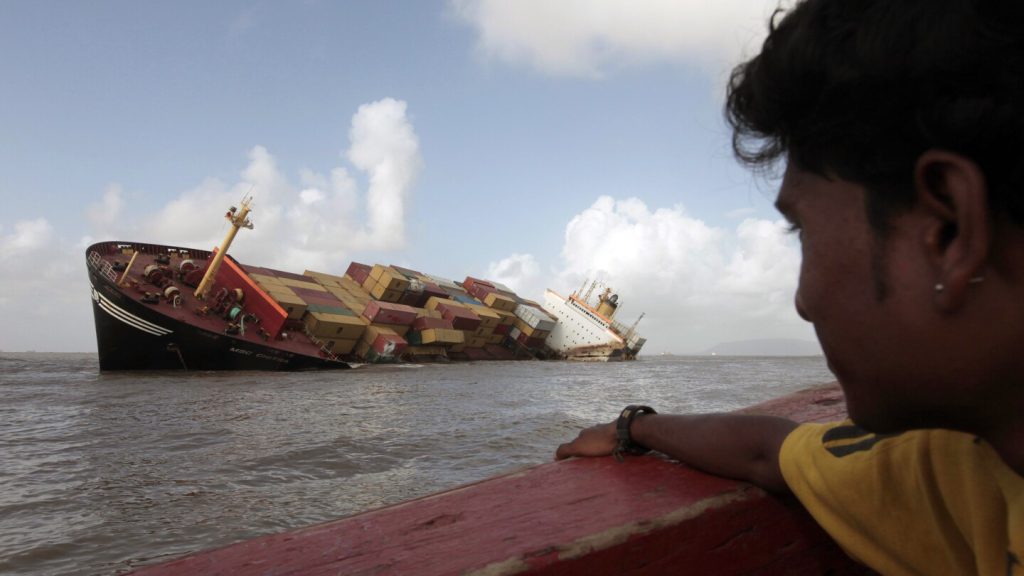Russ Lewis, a dedicated volunteer beach cleaner on the Long Beach Peninsula in Washington, has discovered an assortment of peculiar items washed ashore, from playful squirt guns to mismatched Crocs, many of which are remnants from shipping containers lost at sea. Unlike the conventional refuse you’ll find from parties or fishing trips, these items stem from commercial shipping incidents, where vast numbers of containers topple into the ocean during tumultuous weather. Experts estimate that over the past 15 years, more than 20,000 containers have been lost, leading to environmental hazards as their contents wash ashore or sink to the ocean depths. The obsession with tracking and addressing the debris is underscored when Lewis notes that finding multiple pieces of a lost item is a definitive sign that a significant event has taken place.
The shipping industry, which is responsible for transporting a staggering volume of goods globally, faces a concerning issue with container losses at sea. An estimated 250 million containers are shipped each year, but a significant portion doesn’t make it to its destination. The World Shipping Council reports an average of 1,500 container losses annually, though the actual figure might be higher due to underreporting in the industry. The contents of these containers, including everything from bicycle helmets and Crocs to hazardous materials, can have devastating effects on marine life and environments when they are lost. The ONE Apus shipping incident in 2020 is a prime example, where nearly 2,000 containers were lost after the ship encountered heavy seas, resulting in debris washing up not only on Long Beach Peninsula but also reaching far-off places.
Marine biologists and environmental advocates stress the urgency of paying attention to these shipping container spills, as they contribute to pollution and harm marine ecosystems. For instance, cases like the X-Press Pearl disaster in Sri Lanka, which spilled over 1,400 containers, leading to a catastrophic release of plastic pellets and toxic chemicals into the ocean, highlight the need for more stringent oversight and preventive measures in container shipping. Local communities dependent on fishing suffered immense losses, struggling to recover economically while dealing with the long-term ramifications of marine pollution.
The aftermath of such spills can be lethal for both the local economy and marine life. Cleanup operations are arduous and often costly, with local governments overwhelmed in managing the mess. Scientific efforts have revealed that even non-toxic debris can disrupt entire ecosystems, blocking light and interfering with the growth and health of vital marine species. In the case of the President Eisenhower incident off the central California coast, large cotton bales washed ashore posed dangers, especially near sensitive marine habitats. Although the company had some financial accountability for the cleanup, no legal penalties were enforced, illustrating the often-ineffective regulatory framework for handling such environmental incidents.
The complexities of the global shipping industry exacerbate the issue of container loss. Modern container ships, which are designed to carry massive amounts of cargo, are difficult to maneuver in rough seas, increasing the likelihood of cargo loss during adverse conditions. Mislabeling and improper stowage of containers contribute to accidents, often leading to severe environmental consequences. The industry relies heavily on self-reporting for container losses, which means a full picture of the issue is often obscured; data is inconsistent and raises concerns about accountability in the maritime shipping sector. Proposals are being discussed to improve transparency and reporting, but without enforceable regulations, there may be limited compliance amongst operators.
As container losses persist, the impact on marine ecosystems and coastal communities brings forth pressing concerns for future environmental sustainability. Marine biologists warn of long-lasting adverse effects as unmonitored containers sink and alter underwater ecosystems. Due to their size, lost containers can crush habitats and influence the flow of sediment and water, profoundly affecting the deep-sea micro-ecosystems. Groundbreaking studies are being undertaken to understand how these containers change marine environments over time, revealing an unsettling interaction between humanity’s consumption habits and ocean health.
The story of Russ Lewis and the impacts of lost shipping containers underscore the broader ramifications of modern-day consumer habits, globalization, and the environmental costs of our transportation systems. As marine pollution continues to threaten both local livelihoods and global ecosystems, the focus on rectifying shipping practices and improving waste management strategies becomes essential. Solutions require collaborative efforts from governments, environmental organizations, and the shipping industry to ensure a more sustainable future capable of vanquishing environmental negligence in our oceans and coastlines.










